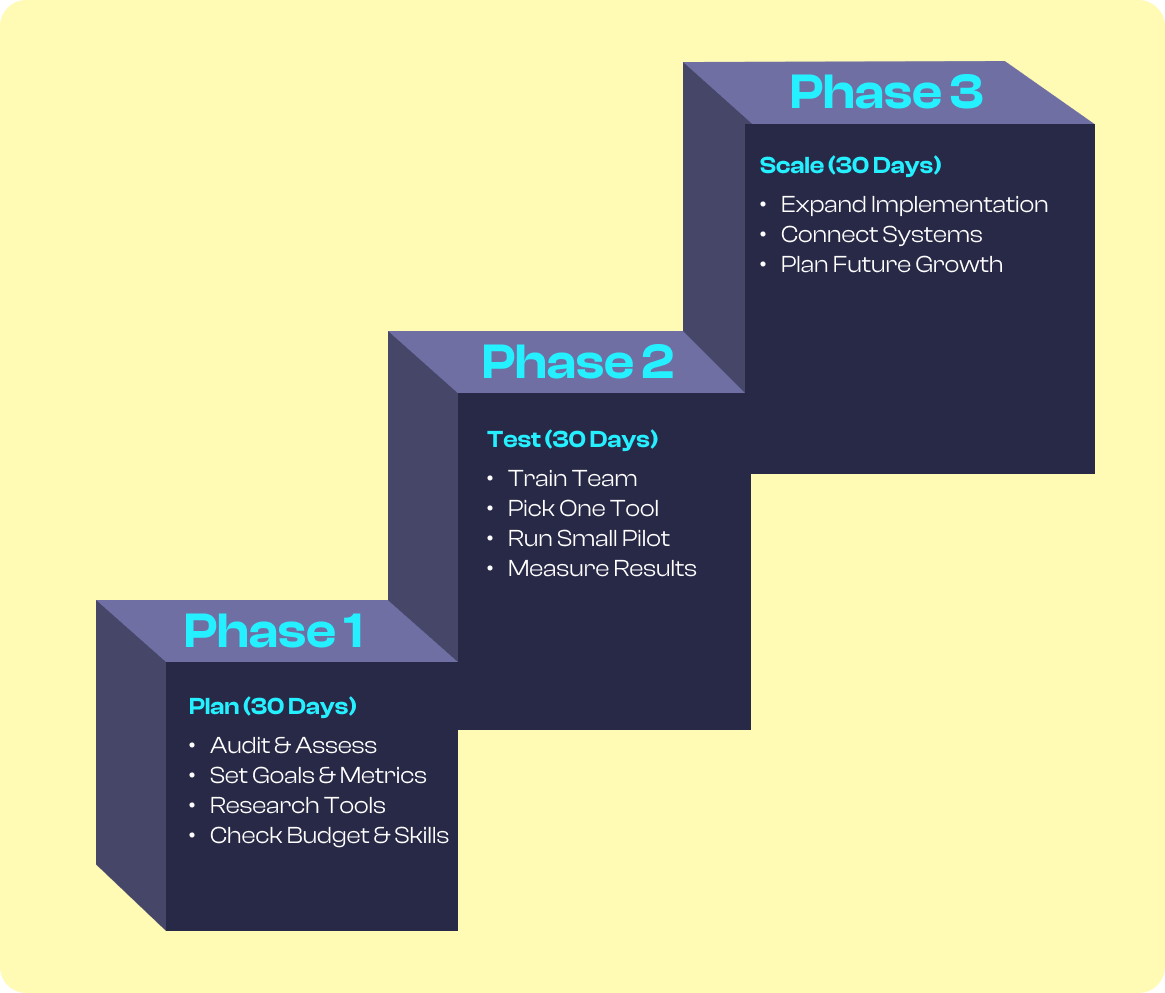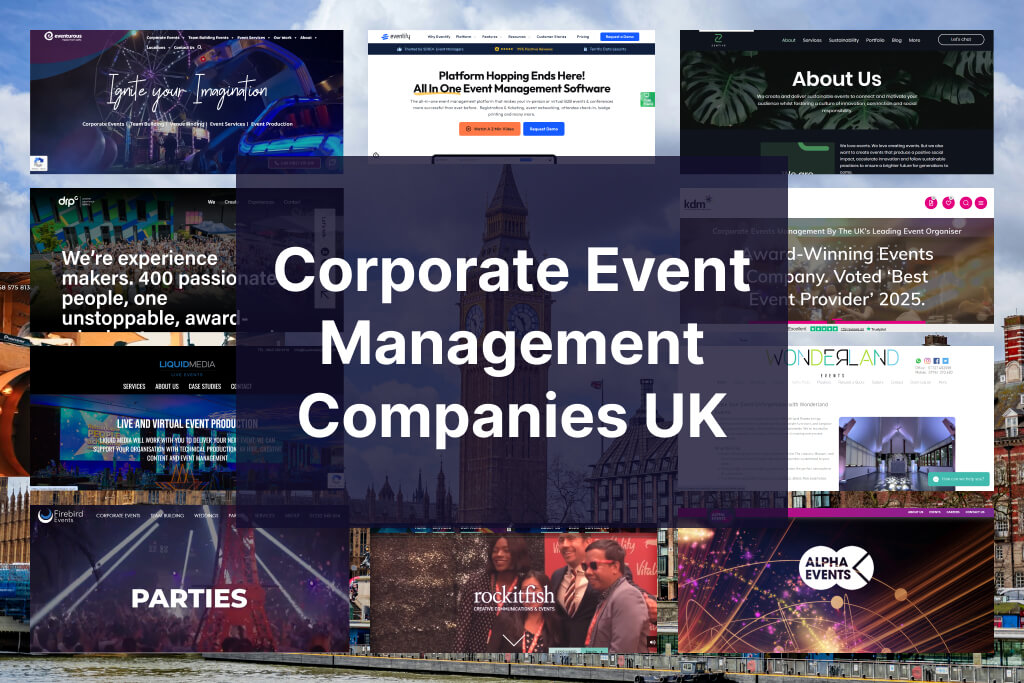Key Takeaways
* Implementation of AI across the event lifecycle helps save time, automate repetitive tasks and improve event ROI.
* AI implementation is a stage based process with a pilot run being key to gauging success.
* The fears around AI adoption amongst teams can be eliminated with adequate training and upskilling measures.
* AI will not replace event planners. Instead it will optimize their current capabilities while eliminating stress.
* The metrics to measure AI success need to be consistently monitored to best identify the benefits of AI.
* Scroll till then end to access a FREE guide on AI tools for your next event.
“Predicting the future isn’t magic, it’s artificial intelligence.” ~Dave Waters
Fads, trends, job-snatchers, an episode straight out of black mirror - AI is termed many things. Sticking to facts, 45% of event planners and directors are already adopting AI, because artificial intelligence is here to conquer……
Nah! It's here to help you conquer all the endless and time consuming tasks that event planning is notorious for. Spending hours scouting for vendors? A single prompt will help you find, compare and assess vendors and venues. Unsure of how to write speaker bios? A free version of Claude will do the trick. Feel lazy to plan an entire event? Plan a fully automated AI event like AutonomousXP.
The last statement is exciting or scary or perhaps both, depending on what your idea of AI is. An evil genius that snatches jobs or an assistant that helps scale and expand your work. If you belong to the latter group, then this article is for you.
By the end of the article, you will learn:
- About how AI is changing the event management landscape (for the better).
- The AI tools you can work with.
- How you can integrate AI at different touch points of your event cycle and everything you can do with those additional free hours ;). Just kidding!
AI Adoption In The Event Tech Space
Before we tell you about some cool tools that your peers are working with, let’s address the digital elephant - Why is AI adoption important for event planners? Because what you are creating is not just a single event with catering thrown in - you are creating an experience. It’s complex project management.
Do Event Planners Need AI?
You are managing vendors, chasing speakers, connecting with attendees and hoping attendees connect with each other. There are venues to be decided, booths to be set up and exhibitors and sponsors need you too. When your mind is pulled in a million directions, you need an anchor. That’s what AI is for you - it automates:
* everyday tasks of manually entering data.
* offering and comparing information on vendors
* manages your event travel plans
* looks at event data and throws up engagement patterns even experienced planners may miss.
The bottom line - directional productivity.
Automation is already benefitting planners like you , take this Harvard Business School study which states that teams that use generative AI deliver 40% higher quality outcomes than teams not using AI.
Not using AI will always be a choice. You can stop reading right now or jump to the next section and automate integral aspects of your event lifecycle.
AI In Your Event Lifecycle: Use Of AI Assistants Across Your Event Lifecycle
On paper, an event lifecycle seems simple enough - pre-event planning, event day execution and post-event analysis. Child’s play to anyone who is unaware of the multiple little decisions and executions that go in making each stage functional and successful.
With AI automation you can instantly eliminate the smaller problems that snowball into larger roadblocks.

Phase 1: Pre Event Planning and Strategy
Here’s what AI can help you figure out.
1. Competitor Analysis and Market Research
Sure you have done your competitor analysis but consider AI listening tools like Sprinklr, Brandwatch and Hootsuite’s Listening Tools.
Search for a keyword related to your brand or industry and tune into the social chatter around it. AI scans through mentions and conversations to give you what people in your industry are talking about. It’s a great way to identify your brand mentions and gauge sentiment from attendees of previous events.
2. Theme Generation and Creative Ideation
Good ‘Ol ChatGPT is a great brainstorming tool that can help you come with quirky themes…that are practical. So while your intern suggests going for a winter wonderland theme for your next product release, ChatGPT or similar generative AI tools will give you a more practical approach.
You liked the theme? Now run another prompt to give you more creative ideas.
Try this prompt:
I'm planning a B2B event and need help brainstorming theme ideas. The event type is [product launch / trade show / virtual conference / seminar / other]. Our audience includes [brief description: e.g., senior marketers in SaaS, procurement heads in manufacturing, tech partners, etc.]. The core goal of the event is [e.g., brand awareness, lead generation, education, networking, category positioning, etc.].
Our brand voice is [e.g., innovative and bold / conservative and trustworthy / fun and conversational]. If relevant, the event will align with our product messaging, which focuses on [e.g., automation, ROI, data-driven decision making, etc.].
Can you suggest 5 unique and strategic event theme ideas with names, descriptions, and rationale that tie into these details — and resonate with a B2B audience?
3. Budget Forecasting and Resource Allocation
Budget looks great on paper but is often hard to execute. Budget management and allocation tools like Asana, that integrate AI help you manage your event budget without breaking the bank.
4. Venue Selection
10 interns, 50+ hours, and a chain of negotiation emails lies on the path to venue selection. One of the foundation stones of your live-event is the venue. The process though is so haphazard that perhaps only AI intervention can salvage it.
- Start with automating your venue research and comparison process. This helps you narrow down a venue that meets your location, space and budget needs.
- Next use AI tools to evaluate the selected vendors and even auto-review their contracts and proposals. AI will read the fine print to ensure you don’t sign a deal that has hidden costs.
5. Speaker Content Management
The abstracts, the speaker bios, the Linkedin deep dive - creating content to support your event speakers is time consuming. Outsource it to AI and watch it create compelling speaker bios that are accurate, review abstracts and even offer suggestions. The best part? You can use any of the generative AI tools and run this prompt to get started.
I'm organizing a [conference / summit / trade show / webinar / seminar] and need help refining speaker bios and session abstracts.
For the bio: The speaker is [name], [job title] at [company]. Their background includes [brief career summary, areas of expertise, relevant awards or credentials]. We want the tone to be [e.g., formal and impressive / accessible and engaging / bold and thought-leading].*
Claude is a free AI tool to help create speaker profiles that don’t sound generic.
6. Risk Assessment and Contingency Planning
Gauging risks and planning for the ‘worst case’ are integral to your event planning strategy. AI tools add accuracy to the process and offer a faster turnaround. FlowForma, Nintex, Appian are tools you can explore.
7. Registration and Attendee Management
Speed, personalization and accuracy are guaranteed when you integrate AI into your registration process. AI’s data analytics helps process and catalog your large registration database. It also has predictive models that help anticipate and prepare for attendee preferences.
The sweet part? Integrating AI early on means your entire event life cycle is synced. The personalization this offers when it comes to session recommendations, and content workshops is unparalleled.
Phase 2: During-Event Operations
.jpg)
1. Personalized Attendee Experiences
Attendees are at your event for one reason - networking. Help them achieve this and you have recurring registrations for life. AI driven matchmaking helps connect attendees with like-minded colleagues.
The biggest benefit? Instant rapport building without the small talk - cards and ideas are exchanged. This ups the sales conversion rates. Tools like Eventify and Grip assess attendee behaviour, giving you the option to create interest tags that help with event matchmaking.
2. Real-Time Event Management
AI co-pilots and chat bots are great to boost event support without additional manpower. You don’t need 10 ground staff to direct attendees to the nearest charging station or repeat the Wi-Fi password. AI power chatbots are doing this in seconds.
Impact Beyond Numbers
What AI tools are successfully doing above the numbers is fostering inclusivity at events. You can use tools for real-time captioning to live audio translations - so everyone stays in the loop.
Surveys and polls are traditional event features - elevate these with live sentiment analysis. Know what attendees feel about your event in real time.
Remember how in a pre-event strategy you adopted AI to assess risk and implement predictive analysis? That will benefit you when you are trying to crowd control and manage an emergency crisis. AI strengthens your communication systems allowing you mitigate situations before things escalate.
3. Intelligent Data Analysis
Data analysis is part of your post-event processes but it’s time consuming - even with in-built analysis tools. Attaching AI to these operations accelerates the analysis, helps you identify hidden patterns and automates report generation - a repetitive task that shouldn’t need your attention. Julius AI and Tableau are some analysis tools to streamline the post-event data analysis process.
After AI has helped you identify data trends and patterns, tap into its predictive modeling capacity. With AI you can get an insight into future outcomes and this makes room for continuous improvement.
Using AI in Your Event Workflow
Here’s the only guide you need when implementing AI in your current event workflow. We start with:
Phase 1: Planning and Assessment
.jpg)
Asking The Right Questions
- Will implementing chatbots into current processes require staff training or outsourcing? Gauge the tech literacy of your staff and your financial bandwidth is necessary at this stage.
- What are the metrics you will use to measure success?
- What are the integration capabilities of your current event tech stack?
Here’s your detailed implementation plan for phase 1 to get you started.
Day 1-30: Defining The Why and What
Week 1–2: Assess & Set Goals
- Audit current event tools and workflows.
- Identify 5-6 pain points in your current process and how AI can help. Eg; automating registrations, creating event collateral)
- Define AI led success metrics (Faster check-ins, fewer support emails)
- Assess resource literacy and financial bandwidth.
Week 3-4: Explore Tools
- Your tech stack audit helps better find the right AI tools.
- Check integration and cross-tool communication.
- Align your AI tools investment with available budget and ROI.
Phase 2: Pilot Implementation
Test the waters instead of setting sail in the deep seas of AI implementation. Start with a pilot project for short listed AI tools.
- Start with integrating AI into one single product category.
- Focus on one event lifecycle stage. For eg; implementing tools that help vendor scouting in the planning stage of your event.
- Measure progression.
Day 31 - 60: Pilot Deployment
Week 5-6: Team Training and Setup
- Get your team onboard. Discuss and dissect how you can leverage AI while preventing over-reliance.
- Nominate team members to lead AI driven projects.
- Develop feedback mechanisms that gauge implementation success.
- Identify the specific event phase
Week 7-8: Limited Deployment
- Implement the tool in the identified event use case. For example, automating event registrations and exporting them into your existing CRM.
- Monitor results consistently.
- Encourage team leaders to share feedback on integration capacity, ease of adoption and efficiency.
Phase 3: Complete Implementation
- Experiencing positive metrics during the pilot? Then designate a member to oversee complete implementation (ideally someone who was part of the pilot team)
- Continuously monitor results. Eg; you can have review meetings weekly or bi-weekly to assess success and pitfalls.
Days 61-90: Scaling
Week 9-10: Full Implementation Planning
- Expand the use of AI to other aspects of your event lifecycle.
- Build communication systems between AI tools used across the event lifecycle.
Week 11-12: Future Strategy
- Create a long-term roadmap for use of tools.
- Budget planning for future AI expansions.
AI Metrics Event Planners Must Measure
.jpg)
How do you know what metrics to measure (that add value) for new AI tools?
Our list will give you a great base to start with:
Event Specific
- Registration completion rates (X successful registrations done in Y time)
- Attendee engagement (X times improvement compared to pre-AI data)
- Net promoter score improvements (gauging customer loyalty and satisfaction)
- Support resolution time (X queries addressed successfully in Y seconds/minutes)
- Stakeholder Satisfaction scores (X times more footfalls at exhibitor booths).
- Task Completion Time (Successfully automated/semi-automated X number of tasks in Y hours)
Long Term Metrics
- Client retention and repeat business rates
- Team productivity and satisfaction
Common Challenges in Adopting AI in The Events Industry (With Solutions)
Any new tool offers implementation challenges. It’s important to make room for these to better gauge the success of your AI tools. With accelerated AI implementation across the event lifecycle, teams are reporting challenges. Learn from these to better optimize your AI investment.
1. Managing less than 100% AI accuracy.
Problem: Humans make mistakes, AI makes less mistakes. It still makes errors.
Solution: The solution is to eliminate over-reliance and always have experienced team players review and validate event data.
2. Adoption
Problem: AI literacy and prompt engineering are skills that resources don’t currently have.
Solution: On the job training and getting experts to educate is a great way to bridge the gap.
3. Integration Limitations.
Problem: AI’s capacity is great but limited, so fragmented systems cannot function on a whole.
Solution: Integrating AI or using end-to-end event management tools like Eventify with native AI tools can solve these problems.
4. Use Cases
Problem: Establishing a fit in the present event workflow is a common challenge.
Solution: Testing the waters with pilot projects instead of complete implementation can help identify profitable use cases.
5. Budget and ROI
Problem: Adding expenses to an ever shrinking event budget doesn’t sound like the best idea to stakeholders.
Solution: Run a pilot and aggressively measure outcomes, adoption and productivity metrics.
The Future of AI
.jpg)
"AI is the new electricity.”
– Andrew Ng, Co-founder of Google Brain and Coursera
AI In The Event Industry - Tips for Fair Adoption
AI’s adoption comes with its own perils - nothing a keen eye and fair adoption practices can’t fix. Yet it’s important to identify what problems AI adoption can create to prevent these right at the start of your strategy.
- There is no defined legislation around data use and AI, leaving a gaping hole that puts data security into question.
- The solution to such concerns is tools like Microsoft Entra that give attendees the power to share their event data.
- GDPR compliance automation.
- Identifying the algorithmic biases in AI and setting corrective measures in place.
Sustainable Solutions - AI is here to stay. What you can do is implement protocols, data validation protocols and concrete brand guidelines that help build productivity without displacing your brand’s ethics and voice.
The Future of AI
“The future of AI is not about replacing humans, it’s about augmenting human capabilities.”
– Sundar Pichai, CEO of Google
Event planners aren’t replaceable. You are the creative fuel, the project orchestrator with the capability to adapt to the ever evolving event landscape. Yet the fear of the unknown is real with AI. Here are some tips to address the fear head on:
- Attendee-First - When you implement AI in your event strategy, think from the POV of your attendees. Then work backwards towards the goal of attendee engagement. This helps integrate AI into processes that drive results.
- Train and Practice - Show your employees that AI is a tool, not a replacement. Allow them to play around with prompts and educate them on best practices.
- Assistant Approach - AI is your assistant, use it accordingly. Identify repetitive tasks that limit your creativity and outsource it to AI.
Eventify’s AI Co-Pilot In Your Event Lifecycle.
There is a definite need of improving the attendee experience - AI fits in perfectly to meet this demand. That’s why we built a native AI Co-pilot that complements Eventify’s Event App. What it helps you achieve is instant query resolution and frees ground staff from unproductive tasks like repeating the ‘wi-fi’ password and redirecting attendees to the right booth.
This is the start - our AI driven matchmaking feature optimizes event networking by matching your attendees based on a compatibility score. Once attendees add relevant interest tags to their profiles, the AI feature auto-identifies other attendees with similar interests and gets them talking. The awkward pauses are replaced by higher conversions.Sounds like the AI tool you need?






.png)





